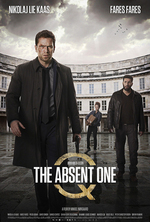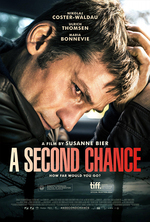Film Screening 10th September, 2016

The Absent One (Fasandræberne)
7:00 PM, 10th September, 2016
- MA
- 115 mins
- 2014
- Mikkel Nørgaard
- Nikolaj Arcel, Rasmus Heisterberg
- Nikolaj Lie Kaas, Fares Fares, Pilou Asbæk, Johanne Louise Schmidt
These screenings of The Absent One and A Second Chance are presented by the Embassy of Denmark
To say I like Scandinavian crime novels is like saying that Lisbeth Salander is a decent hacker, or that Kurt Wallander is rather pessimistic, or that the residents of Fjällbacka have more reason than most to fear for their lives. Or, if you prefer, it’s like saying that dropped objects have a tendency to fall, that water is wet, and that the world is a bleak and cheerless place best viewed through a haze of alcohol as you hunt down miscreants and bring them to justice.
They’re novels that also make for particularly good film adaptations. Part-noir, part-action, part-existential drama, these are films that are dark and sardonic and utterly engaging.
The Absent One is a terrific example. It is the second film about Department Q, the basement of Copenhagen’s police station where cold cases go to die. Carl Mørck (Kaas) has been sent there for his sins but subverts his superiors by solving the ancient cases, ably assisted by the enigmatic Assad (Fares) and the intrepid Rose (Schmidt).
This case concerns a 20-year-old murder of twin teenagers, brought to Carl’s attention by a retired cop who promptly offs himself upon handing over the evidence. Carl doubts that the man who was convicted of the crime is really guilty, and starts to look into the past for clues while tracking down an elusive homeless woman. The present-day investigation is interspersed with flashbacks to a terrifying group of teenagers at an exclusive boarding school.
The plot is tense and twisted and utterly compelling, the characters brooding but often hilarious. Like a shot of schnapps on a freezing evening, this film is a glorious treat.
Helena Sverdlin

A Second Chance (En chance til)
9:05 PM, 10th September, 2016
- MA
- 102 mins
- 2015
- Susanne Bier
- Anders Thomas Jensen
- Nikolaj Coster-Waldau, Ulrich Thomsen, Maria Bonnevie, Nikolaj Lie Kaas
You know, Denmark is a lovely place: gorgeous landscapes and streetscapes, consistently hovering near the top of international quality-of-life rankings, with probably more fictional violent crimes per year than real ones. Just as a reminder if you’re reading this halfway through our Danish crime double that there really aren’t as many corpses and abused children littering the fens as you might think. It’s because of this that Danish (like Swedish) crime fiction is so engrossing: there’s a deep humanism behind it; it’s never a case of yawn, another murder.
You’ll notice an obvious link between this and the previous film, in the easy relationship between two very different police partners: the stable, happily married Andreas (Coster-Waldau) and the life-going-down-the-drain, drinking-more-by-the-day divorcé Simon (Thomsen). But their visit to what is, for Andreas, a particularly heartbreaking crime scene sets events in motion that has both men surprising themselves by playing against type.
Director Susanne Bier is best known for Brothers (2004) and the Best Foreign Language Film Oscar winner In a Better World (2010). Her other films, I believe, tend to be underrated – she is never less than assured in stringing them together and always manages to convey a tender concern for her characters. That’s what makes Danish crime work so well, after all, and it’s sorely needed here, counterbalancing some of the depravity, even more depraved than what you saw in the previous film.
Henry Fitzgerald